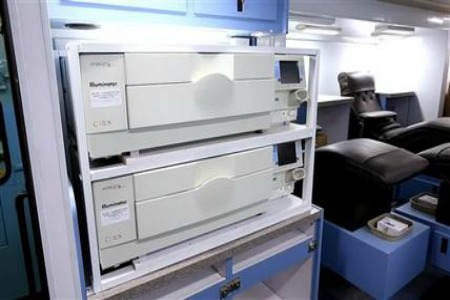
A coalition of companies and aid groups announced plans Tuesday to test experimental drugs and collect blood plasma from Ebola survivors to treat new victims of the disease in West Africa.
Plasma from survivors contains antibodies, substances the immune system makes to fight the virus. Several Ebola patients have received survivor plasma and recovered, but doctors say there is no way to know whether it really helps without a study like the one they are about to start within a month.
The Bill & Melinda Gates Foundation is giving $5.7 million to scale up production of the treatments for the project in Guinea and other Ebola-affected countries in Africa. More than a dozen companies, universities and others are contributing supplies, staff and cash, and are working with the countries and the World Health Organization on specific procedures and locations.
Besides helping Ebola patients now, plasma “could be a tool for a future epidemic as well” from different viruses, Microsoft co-founder Bill Gates said in an interview with The Associated Press.
“You might not have drugs and vaccines for some new thing” and it would be good to have capabilities in place to collect and give plasma to fill the gap until those other tools can be developed, he said.
There are no drugs or vaccines approved now for Ebola, which has killed about 5,000 people this year in West Africa, most of them in Guinea, Liberia and Sierra Leone. Doctors Without Borders last week also said it would host studies of experimental treatments and plasma at three of its West Africa treatment centers.
The drugs to be tested by both groups include brincidofovir, an antiviral medicine that has been tried in a few Ebola cases so far. Its maker, North Carolina-based Chimerix Inc., developed it to treat other types of viruses and lab tests suggest it might fight Ebola.
“We said to them, `well, if money was no constraint, how much could you make?’ and they gave us a number,” Gates said. “So we said, `OK, we’ll take the risk that maybe nobody will ever buy this from you. So we’ll help you scale up the manufacturing.'”
Making plasma available is a complex task. Plasma is the clear part of blood, and the part that contains antibodies. In Africa, donors’ blood will be filtered through a machine to remove small amounts of plasma and return the rest of the blood to the donor – a process that allows someone to donate as often as every two weeks.
One of the first patients successfully treated for Ebola in the U.S. – aid worker Dr. Kent Brantly – received plasma from a 14-year-old boy he treated in Africa, where he was infected. Brantly has donated plasma several times to Ebola patients in the U.S.
A plasma recipient must have a compatible blood type as the donor. Survivors who give plasma also must be tested to make sure they are cured of Ebola and don’t have other diseases such as hepatitis, syphilis or HIV. The Africa study will take an added step – use of an experimental system by Cerus Corp. for inactivating viruses in blood.
Dr. Ada Igonoh, a doctor in Nigeria who got Ebola from a patient and recovered, expects to donate plasma and recruit others for the study.
“Survivors will be willing if they understand the goal,” she said.
She and Brantly met with Gates to discuss the project earlier this month at an American Society of Tropical Medicine & Hygiene conference in New Orleans.
Dr. Luciana Borio, who is leading the Food and Drug Administration’s Ebola response, spoke at the conference about plasma. Even though it seemed to help in some cases, “The bottom line is that we don’t really know if it helps and to what degree it might help,” she said.
“We would love to not be in the same situation in the future,” and a study is the only way to know for sure, she said.
Clinical Research Management Inc., a Northeast Ohio company that contracts with sponsors to run clinical trials, will lead the plasma study in Africa. Plasma will be collected through three bloodmobiles donated by another Microsoft co-founder, Paul G. Allen, and the Greenbaum Foundation. The bloodmobiles have been flown to Africa.
The U.S. Army Medical Research Institute of Infectious Diseases (USAMRIID) will provide Ebola testing for the study. Several universities will help, as will the Blood Centers of America and the Safe Blood for Africa Foundation. About a dozen companies donated equipment and supplies.